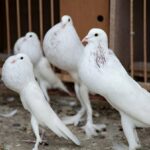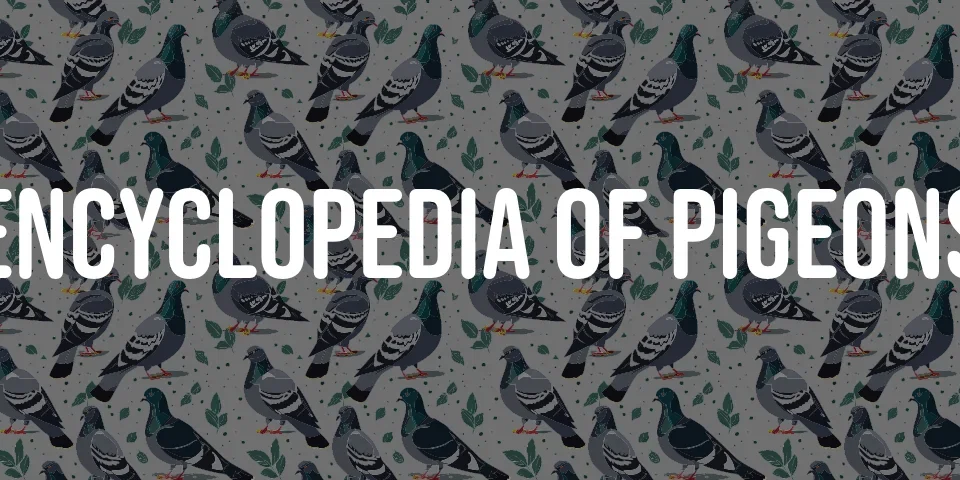Pigeon Lifespan Overview
Pigeons live for different lengths of time based on where they reside. In natural settings, their lifespan usually ranges from 3 to 5 years due to threats from predators and limited resources. In cities, pigeons face additional issues such as pollution and human-related dangers, which often reduce their lifespan to between 2 and 4 years.
In contrast, pigeons kept in captivity benefit from a stable environment where nutrition, healthcare, and safety are prioritized. This nurturing care can greatly extend their lives. Many captive pigeons live up to 15 years or more; some even reach the age of 20 when conditions are optimal. These variations highlight how much the environment influences pigeon longevity.
A healthy diet and access to medical care are crucial in determining how long pigeons live. Adequate nutrition provides vital vitamins and minerals, while regular veterinary check-ups help ward off diseases that could shorten life. Furthermore, proper housing protects them from severe weather conditions and potential threats.
Ultimately, a pigeon’s lifespan is largely dependent on external elements like habitat and quality of care. Recognizing these factors can enhance their wellbeing across different environments.

Average Lifespan of Pigeons in Different Environments
Pigeons’ lifespans vary significantly based on their environment.
- wild pigeons, often residing in natural habitats, typically survive for 3 to 5 years due to threats from predators and diseases,
- urban pigeons encounter additional risks such as pollution and human-related dangers, reducing their lifespan to around 2 to 4 years
- feral pigeons in cities experience similar life expectancies, generally living between 2 and 5 years.
These birds face inconsistent food sources and environmental challenges that impact their longevity.
In stark contrast, domestic pigeons kept as pets can enjoy much longer lives. With proper care—including a nutritious diet and routine veterinary checkups—they may live from 15 to 20 years or even beyond if conditions are ideal. This variation underscores the significant role habitat plays in determining how long pigeons live.
Factors Affecting Pigeon Longevity
The lifespan of pigeons is shaped by several elements, including their surroundings, diet, and access to healthcare. Urban pigeons often encounter threats from predators such as hawks and falcons. They also face health issues due to diseases spread by tainted food, as well as stress caused by inconsistent access to sustenance and water.
Weather plays a significant role too. Harsh conditions can make it difficult for wild pigeons to obtain food, resulting in malnutrition and increased susceptibility to illness. Conversely, domestic pigeons generally have longer lives because they benefit from stable environments with adequate nutrition and routine veterinary attention.
Additionally, pollution in cities negatively impacts pigeon health, reducing their life expectancy compared to those living in rural areas. Therefore, providing a nutritious diet filled with essential vitamins along with ensuring medical care is vital for prolonging the lives of pigeons in different habitats.
Comparing Lifespans: Domestic, Wild, and Urban Pigeons
The lifespan of pigeons can significantly differ depending on where they live. Domestic pigeons are known to enjoy the longest lives, often reaching 15 to 20 years when kept in captivity. This longevity is attributed to their stable living conditions, including regular meals and access to healthcare.
In contrast, wild pigeons typically have shorter lifespans, usually around 3 to 5 years. They constantly face threats from predators and struggle with limited resources. Urban pigeons encounter even harsher challenges, living only about 2 to 4 years due to factors like pollution and hazards such as traffic and buildings. Irregular food supplies and environmental stress further decrease their life expectancy.
Thus, while domestic pigeons flourish in controlled settings, those in the wild or urban areas contend with numerous external factors that curtail their lifespans. Recognizing these variations highlights how a pigeon’s environment profoundly impacts its life expectancy.
Domestic Pigeons: Lifespan in Captivity
Pet pigeons often enjoy a much longer lifespan than their wild counterparts, sometimes living up to 15 or even 20 years. To achieve such longevity, they require attentive care. This means providing:
- balanced diet rich in essential vitamins and minerals to keep them healthy and lively,
- regular check-ups with a veterinarian for early detection and prevention of illnesses,
- secure and comfortable home to shield them from harsh weather conditions and potential hazards,
- toys and opportunities for social interaction to stimulate their minds and enhance their quality of life.
In essence, when given the right nutrition, healthcare, and environment, domestic pigeons can lead long, healthy lives far better than those of their wild peers.

Wild Pigeons: Lifespan in Natural Habitats
Wild pigeons, such as rock doves, usually survive for about 3 to 5 years in their natural habitats. Their lifespan is significantly impacted by predators and illnesses.
- hawks pose a particularly serious threat, leading to numerous pigeon fatalities,
- diseases can spread quickly because of cramped living spaces and limited resources,
- in these harsh conditions, natural selection favors the survival of the fittest.
Consequently, wild pigeons often have shorter lives compared to those bred and kept in captivity.

Urban Pigeons: Lifespan in Cities
Urban pigeons usually have a lifespan of just 2 to 4 years, which is shorter than one might expect due to the difficulties of city living. They face significant threats from predators such as hawks and falcons. Moreover, consuming contaminated food often leads to diseases that further reduce their longevity. The pollution and bustling traffic in cities also diminish their survival rates. Despite having ample food thanks to human waste, these challenges result in higher mortality compared to their rural counterparts.
Pigeon Mortality Factors and Health Issues
Pigeons encounter numerous challenges that influence their lifespan. Illnesses such as respiratory infections and parasites significantly threaten them by compromising their immune systems and spreading rapidly within large flocks. This leads to deteriorating health and increased mortality rates.
Furthermore, predators are a constant menace to pigeons.
- birds of prey like hawks and falcons frequently hunt them,
- particularly targeting those that are slower or unwell,
- this predation contributes to the shorter lifespans observed in both wild and urban pigeon populations.
Environmental factors also play a crucial role in affecting pigeon survival.
- the expansion of cities destroys natural habitats,
- reducing available nesting spots and food sources,
- pollution from human activities contaminates their food supply with harmful substances.
These issues underscore the importance of gaining a deeper understanding of the health challenges pigeons face. By emphasizing conservation initiatives and more thoughtful urban planning, we can work towards mitigating some of the threats that endanger pigeons today.
Common Diseases and Predation
Pigeons encounter a range of health challenges and predators that significantly impact their longevity. Among the common ailments they suffer from are:
- mite infestations,
- paramyxovirus (PMV),
- paratyphoid,
- canker.
These diseases spread swiftly in crowded environments, compromising the birds’ immune systems and increasing mortality rates, thus posing serious risks to their well-being.
Predation adds another layer of threat to pigeons. Birds of prey such as peregrine falcons and sparrowhawks often target them, particularly when they are weak or unwell. This predatory pressure further diminishes the lifespan of pigeons both in urban settings and the wild.
Recognizing these concerns is crucial for enhancing conservation efforts aimed at mitigating factors that contribute to shortened lifespans in pigeons.
Impact of Urban Development and Habitat Destruction
As urban areas expand, they significantly impact pigeon populations by transforming natural habitats into buildings and infrastructure. This shift diminishes the availability of safe nesting sites and food, forcing pigeons to compete intensely for these scarce resources, which can often result in increased mortality rates.
Lacking proper nesting spaces, pigeons are compelled to adjust to city life. Yet, urban settings introduce additional hurdles such as pollution and human interference, which can disturb their living conditions and potentially reduce their lifespan in such environments.
Recognizing the effects of urban development on pigeons highlights the importance of integrating wildlife conservation into thoughtful urban planning.
Maximizing Lifespan: Care for Pet and Captive Pigeons
Caring for pet and captive pigeons is essential for ensuring they enjoy a long, healthy life. Start by offering them a well-rounded diet, rich in the nutrients and vitamins necessary to maintain their health and vitality. Regular veterinary visits are crucial as well; these check-ups, along with vaccinations, help ward off potential illnesses.
- provide a cozy habitat that offers protection from harsh weather and threats,
- include toys and opportunities for social interaction to keep their minds engaged,
- enhance their overall well-being.
By concentrating on these elements, your pet pigeons can enjoy longer lifespans compared to their wild counterparts.
Proper Nutrition and Diet
Good nutrition is vital for the health and lifespan of pet and captive pigeons. Their diet should be well-rounded, including a mix of:
- grains,
- seeds,
- fresh vegetables,
- occasional fruit.
This variety offers essential vitamins and minerals that boost their immune system and enhance overall wellness. Additionally, a nutritious diet reduces disease risk by providing key nutrients. Understanding pigeons’ dietary needs is therefore critical to ensuring their long-term health.
Importance of Veterinary Care
Taking pigeons for regular vet visits is essential to ensure their well-being. These appointments contribute significantly to extending their lifespans and maintaining robust health. Routine check-ups are an opportunity to detect any health concerns at an early stage, allowing for prompt treatment. By identifying issues early on, diseases can be prevented or managed more effectively. Veterinarians keep a close watch on the pigeons’ health and provide tailored care suited to each bird’s specific needs. Additionally, vaccinations play a vital role in guarding against common illnesses, further enhancing their overall health. Therefore, consistent veterinary care is vital for improving both the quality of life and longevity of pet and captive pigeons.

Environmental Enrichment and Housing
Ensuring pigeons thrive involves creating a stimulating environment and providing suitable housing. A vibrant setting is essential for their mental health, as it helps reduce stress. Key elements, such as:
- exercise,
- social interaction,
- secure nesting spots.
these activities keep pigeons lively and engaged, which lowers the risk of health issues associated with boredom.
Equally important is offering safe housing to protect pigeons from threats like predators and harsh weather conditions. A stable living space contributes significantly to their overall health. The ideal housing should provide:
- ample space,
- proper ventilation,
- protection from extreme temperatures.
in essence, prioritizing both environmental enrichment and appropriate housing leads to healthier pigeons with extended lifespans by enhancing their physical and mental well-being.

Notable Pigeons and Lifespan Records
Pigeons can enjoy remarkably long lives when kept in captivity, often living 15 years or even longer. This longevity underscores the impact that attentive care has on their lifespan. Take “Peace,” a pigeon whose name reflects the potential for such extended life. In settings where they are well cared for, pigeons can surpass their wild counterparts in terms of lifespan by a substantial amount. This emphasizes the importance of providing a proper diet, healthcare, and suitable housing to help these birds thrive over the years.

The Oldest Recorded Pigeons
An English pigeon named Peace holds the record for longevity, reaching an impressive age of 24 years. This exceptional lifespan illustrates the potential longevity of pigeons when they receive proper care. A nutritious diet and comfortable environment are essential for their well-being. Captive pigeons tend to outlive their wild counterparts significantly. Peace serves as a prime example of how attentive care can considerably prolong a pigeon’s life, emphasizing the importance of providing ideal conditions for these birds to flourish over time.






